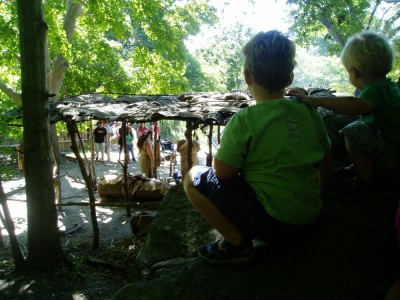Settlement versus Settling
On Wednesday when the Early Intervention specialists were over, I sat on the floor of my living room literally swatting flies away from my baby. To prevent the nurse from phoning DSS over the filth in my house, I explained that there was a brooder of baby chicks in our kitchen. (This sounds more lovely than the equally true explanation: "The flies are attracted to the large box of chicken shit on our counter.")
"Oh!" said the nutritionist in awe, "It's like you're a pioneer woman!"
Pioneer woman? I thought about our pantry stocked with as many boxes of pasta as jars of preserves and I thought: "Pioneer woman? I feel more like a housewife with a hobby."
On Friday we went to Plimoth Plantation to see some REAL pioneers.
In many ways Plimoth Plantation is a crafty homeschooler's paradise. I wandered from hut to hut analyzing what fibers the Pilgrims used for their baskets, or what stitches they used for their knit stockings. When a Pilgrim rein-actor put a poppet in my friend's daughter's hand, it was all I could do to let her hold it for a minute before I snatched it away to reverse-engineer the pattern.
On the other hand, Pilgrim life was hardly driven by DIY daydreams. Most of their thought and energy went into surviving. Farming and construction (my least favorite homesteading hobbies) came first. For clothes and other sundries they preferred to import things from England. They didn't even knit their own stockings.
Of course, this was an economic calculation too. The more corn they sewed the more they could trade with the tribes up north, the more furs they could send to England to become hard currency and "proper made" clothing. They didn't come to the New World for self-sufficient austerity. They came to the New World for this:

A Scholastical Discourse Against Symbolizing with Antichrist in Ceremonies: Especially in the Sign of the Cross.
The came to do their weird religion.
When they weren't reaping and trading and doing carpentry, the settlers were reading tomes like this one, a book of several hundred annotated pages about how the Church of England was into Antichrist shiz. I tried to skim the argument myself, but half the "s" letters were written like "f," and also there were a lot of extra "e"s thrown in there. I sounded out the first paragraph, but a Pilgrim actor interrupted me when he walked in to check whether our kids were breaking ye olde broome.
This field trip made me think that there is no homesteading panacea. There is no group or period or commune we can look at and say triumphantly, "There! That's the way to do socially-conscious, sustainable, happiness." Every life is worked or enjoyed in context. Financial context, geographical context, and in the context of our understanding of God.
If I look into someone else's life, whether they're Pilgrims or Indians or a neighbor down the street who drinks lots of soda and refuses to recycle, I am nothing more than a visitor their human museum. I can only see things as an outsider.
After several hours spent in sunny 1624 my nerves and the children's' nerves were shot. So we stopped at the visitor center concession stand on the way out, and I demanded the largest iced coffee they had. "In this cup?" The server asked me incredulously, holding up a big-gulp used for soda.
"Yes," I answered, "I want the biggest cup of coffee you have."
"Did you say you wanted decaf?" she asked.
"No, I did not say I wanted decaf." I said. "Why would I say such a thing? I have to drive home two hours in Friday afternoon traffic with a fussy baby and two cranky kids. I want that big big cup filled with caffeinated coffee, and also want this granola bar for my three year old and this bag of chips for my five year old and we are gonna suck down these carcinogenic treats like we're hungry Pilgrims and this is the first Thanksgiving."
I don't know what makes a beautiful sustainable life. I love knitting and weaving, I love the idea of work, but I also love ready-made clothes as much as the next Pilgrims, and I love driving places in my big minivan and going home with a BIG coffee for the ride.
If this is not sustainable then maybe at least it's okay for now. I have a feeling my level of discourse is too "scholastical." I'd hate to put an ocean of misunderstanding between me and others making the sign of the cross.

